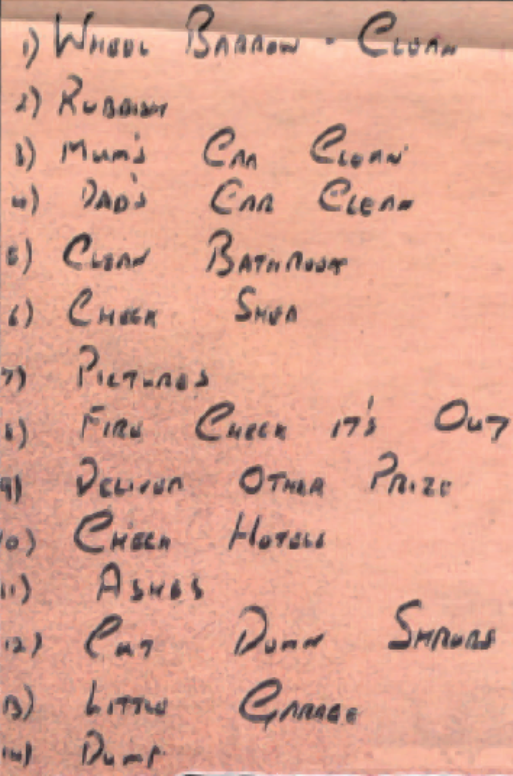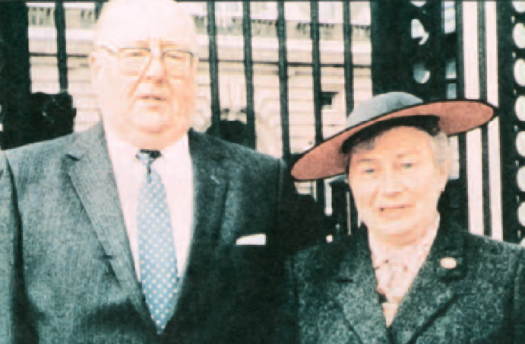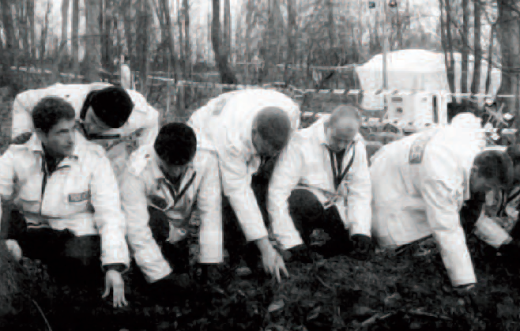Roger Severs had spent his whole life being supported by his parents. When they finally said no to him he knuckled down – and planned their murders…
ROGER SEVERS knew exactly what he was doing – he was organised. He made a list, a premeditated plan. The problem was that Roger had failed at everything he had attempted, and would do so again as a murderer… Roger was an only son and a spoilt child. His father, Derek Severs, a bluntspeaking Yorkshireman who stood six feet tall and weighed 20 stone, had made his own way in the world, eventually retiring as an executive with industrial giant ICI. His wife Eileen, a year older than her husband at 69, had spent many years doing charitable work, which was recognised with the award of an MBE in 1989.
They lived in some comfort in a large bungalow in the village of Hambleton, newspaper “lonely hearts” advertisements, that he was a businessman, a hospital consultant, and even a gynaecologist. But this plump, balding 37-year-old had a number of failed relationships behind him, he had a habit of beating his women, and every time a job fell through, or a relationship with a woman ended, he returned to live with his parents while he licked his wounds and cadged more money to pay off his debts. He spent his time drinking in pubs in nearby Oakham, and was generally surly with his father and mother.
If there was one bright spot in an otherwise bleak situation for his parents, it was the fact that he had fathered a child during his last relationship with a nice woman, a divorcee. He was supposed to help her run the hotel she owned; instead, he ran up several thousand pounds’ worth of debts for her by pocketing the takings Leicestershire, with a view overlooking Rutland Water. They were a two-car couple enjoying their retirement, and not denying themselves some of life’s little luxuries. They were said to be worth a million.
If there was one cloud on their horizon it was their only son, Roger. They had tried to do their best for the boy, educating him privately at Pocklington School, near York. They had rented him a flat, and had spent thousands paying off his debts. But over the years, they had been forced to recognise that their son was a waster, a liar and a cheat.
Roger had never been able to hold down a job. At most he stayed in one post for a few months before either moving on or going through another long period of unemployment when he sponged shamelessly off his parents. He worked as a barman, crop-sprayer and even at an ironmonger’s, but he could never stick hard work or accept the discipline of good time-keeping.
Perhaps the most alarming thing about him was that he was a pathological liar and confidence trickster. At various times he told women he met, and he met all of them through and failing to pay the VAT. The relationship ended as a result, and in April 1993 Roger Severs returned once more to live with his parents. They had wanted a grandchild, and their wastrel son had at last produced one – only to ruin even that for them. But Eileen Severs loved her two-year-old grandson and made a point of keeping in touch with his mother, phoning her almost every evening.
At last, despairing of Roger ever making anything of himself, his parents gave him an ultimatum. He would not get another penny from them unless he mended his broken relationship with his child’s mother. And if he didn’t patch things up, they would exclude him from their will and leave everything to their grandson. Roger Severs tried everything to dissuade them, even resorting to emotional blackmail. He took a drug overdose in an apparent suicide attempt, leaving a note in which he complained that his mother would help anyone rather than him – a snide reference to her charity work.
At around this time, an elderly friend of the Severses met up with Roger. He said later: “Roger was a great worry to his parents, driving them to the depths of despair…Once, when he was moping around his parents’ home, I told him: ‘You’ll send your parents to an early grave. Why don’t you leave them in peace?’ Roger replied: ‘Why should my mother and father be so comfortable, and not me?’” In November 1993 he asked his father to lend him £10,000 to buy into a pub as manager. He thought that this effort to make his own living might impress his father. It didn’t. His father refused to lend him a penny unless he patched up his relationship with the mother of his child. Yet the next day, Roger discovered that his father had lent exactly the same amount to a friend for the same purpose: to buy into a pub.

Beside himself with rage, Roger Severs now began to plot the murder of his parents. The failed businessman, failed publican, failed human being, now attempted to be the act of killing. He wrote down a 14-point check-list of things to do to ensure he didn’t fail to clean everything at the intended murder scene. The list included cleaning the bathroom and the family’s two cars.
On November 13th, 1993, having spent the day drinking at local pubs, he returned to his parents’ home and found his mother alone. She was studying a list of prizes she intended to deliver to local raffle winners. His father was at the pub having his usual evening drink.
Roger Severs attacked his mother in the bathroom from behind, striking her eight times with a heavy mallet, and fracturing her skull. She fell against the side of the bath, her head hanging over it. But her death was not instant. A pathologist later estimated that it had taken her at least 30 minutes to die, and during that time Roger did nothing. He just waited for his father…
When Derek Severs returned at about 10.30, Roger struck him as he got out of his car, hitting him at least 10 times with the mallet he had used to despatch his mother. When he was satisfied that his father was dead, he put his mother’s body, wrapped in a blanket, in the boot of the couple’s Rover. His father’s body, bound with belts and string to make it easier to drag, had to go on the back seat.
The son then drove to Armley Wood, several miles away, burying his parents in a shallow grave which he later covered with two and a half tons of soil. It was the hardest Roger Severs had ever worked in his life. Now he consulted his check-list. He had to divert suspicion about his parents’ disappearance. First, he would deliver the raffle prizes which his mother had been due to distribute. He phoned a woman in the village to tell her that she had won a box of chocolates, which he delivered to her home the next day.
In fact, he spent much of that day going round delivering the prizes to the lucky winners, telling each of his parents’ friends who phoned different stories. He told one that they had gone to visit a South African relative, another that they were visiting a relative in the south of England, a third that his father had suffered a stroke and was convalescing. The following day Roger Severs lit several bonfires in the garden at the rear of the bungalow, disposing of blood-sodden carpets and clothing. His parents’ clothes and belongings he dumped at the local tip, where he also took the bonfires’ ashes, which he got the family’s gardener to help him bag. He also got the gardener to fill a dozen sacks with soil from a nearby paddock. These sacks were then taken by Severs to the woods as additional cover for the graves.
Drinking at the local pub, spending lavishly, he appeared to be very relaxed – even happy. But his parents’ friends were becoming worried about the couple’s absence, and they alerted the police.
A few days later, detectives turned up at the bungalow to ask Roger Severs where his parents were. He politely invited the officers inside. They noted that the bungalow appeared to be clean and tidy. But the detectives could never get satisfactory answers to their questions. Why had he burned the carpets? Because the bath had overflowed and ruined them, he said.
Detective Sergeant John Robertson was later to say: “He was a pathological liar. If you asked him a direct question he always started his reply with something to divert you. He always stuck to his story. He was a very strange man to interview.” The police were not to be diverted for long. They obtained a warrant to search the bungalow, and a forensic team went over it thoroughly. They found evidence that a frenzied attack had taken place, even discovering traces of blood spattered on the garage door. Detectives also found that 14-point check-list. Severs had failed yet again. He was arrested and charged with the murder of his parents even before their bodies had been found. But that was only a matter of time and diligent forensic work (see panel opposite). A search was made, and several miles away in Armley Wood the burial mound was discovered. Officers dug through two and a half tons of soil, broken roof tiles and wood and leaves to reach the bodies, which had lain in their makeshift grave for a fortnight.
Severs was now in Lincoln Prison on remand, awaiting his trial. Detective Sergeant Robertson had the task of visiting him to tell him of the find. The officer said later: “Personally, I’ve never come across anyone like him. When we told him in prison we had found the bodies he said nothing – and walked away.” But he did some thinking. While on remand he tried to commit suicide yet again, with a pills overdose.

The trial of the former public schoolboy for the double-murder began at Nottingham Crown Court on November 21st, 1994, before Mr. Justice Laws. Severs had admitted killing his parents and disposing of their bodies, but he denied murder on the grounds of diminished responsibility. He sat hunched in the dock, his head bowed as his story unfolded.
Mr. John Goldring QC, prosecuting, told the jury that Roger Severs was “quite unlike” his parents, who had been decent, hardworking folk. Roger Severs had no proper job and had had a succession of failed relationships, although he continually “portrayed himself as a successful man” and was jealous when he heard that his father had lent a friend £10,000 to invest in a public house.
“You can imagine the defendant’s feelings about that,” Mr. Goldring continued. “He had wanted money from his father. His father would not lend it to him but had lent it to someone else. It must have been particularly galling as the defendant wanted to buy a pub for himself.”
Describing Severs’s attack on his mother, the prosecutor said: “The blows were hard and fractured her skull. She was hit as she lay on the floor and there were no signs that she tried to defend herself. There was a great deal of blood.” Mrs. Severs was wrapped in a yellow and green blanket and dragged through the bungalow to the car. Fibres from the blankets were later found on Severs’s trousers. The father was wrapped up in belts to make it easier to handle his bulk and, after burying his parents, Severs had scattered leaves on their grave “to make it look natural.”
Questioned by the police, he had told “lie upon lie” during 11 separate interviews, including a story that his parents had gone abroad for a short trip. Roger Severs went into the witness-box to testify on his own behalf. He said he had been cooking a steak, using a heavy steak mallet, on the day of the killings. Then a row broke out over his former girlfriend. He had talked to his mother about a possible reconciliation, but had got nowhere. Then his father returned from the pub and made a disparaging remark about his former lover. “His comments were not very pleasant about her or myself. I still loved the woman and didn’t like comments being made about her.” Severs said that when he reminded his father of his grandchild, “Father was not as enthusiastic as I had hoped, and I felt disappointed and upset. I thought they were both being very unfair to me. “My mind was in confusion, in turmoil. My mother went to the bathroom to run a bath. I followed her in and we continued to argue.”
He claimed he had struck his mother in the bathroom with the mallet while his father was in another part of the bungalow. He said he had followed his mother into the bathroom, still arguing. “She made comments again about the whole situation, and somewhere in it all I remember is that I struck her with the steak mallet. I can’t say how many times. It all happened exceedingly quickly. I can’t remember how long. I just left the bathroom very quickly.
“I don’t think I realised what was happening. I didn’t go into the bathroom with the intention of hitting my mother. I don’t think I was in control. I wasn’t clear about what was going on. I felt very cold. I was sweating. I can’t describe it. It was panic, I think.” Severs said he ran outside and was followed by his father, who asked what was going on. Severs then struck him. “I just lashed out and went straight past him. I have hardly any recollection of what happened. It was a cold night and the cold seemed to start slowly bringing my senses round a bit.

“I recall I had a whisky bottle and drank a substantial quantity. I did not realise what I had hit my father with, or how many times I had hit him. I sat in the greenhouse for quite some time. “The lights of the bungalow were on. I thought about what had happened and went inside. I went into the bathroom and saw what had happened. I just could not believe the events. I think one of my first thoughts was to ring my girlfriend, but I didn’t. At some stage, I passed out.”
Cross-examined by Mr. Goldring, Severs admitted that he had been a confidence trickster for a number of years. He also agreed that he was an accomplished liar, and had told the mother of his child that he was a gynaecologist. He said: “My mother actually called me a pathological liar in front of a psychiatrist after I took an overdose of tablets in 1993.” Severs’s former girlfriend and mother of his child went into the witness-box on the third day of the trial. She said Severs had had a furious row with her just hours before bludgeoning his parents to death – but two days later he had acted with “incredible calm.” He wooed her with a bouquet of red roses and a card reading, “I love you.” Then he took her out to a champagne dinner and asked her to marry him.
During their stormy three–year relationship, she said, he had subjected her to emotional abuse, had been guilty of fraud, lies and deceit, and had been responsible for her four children being put on a social services “at risk” register. She had finally thrown him out.
She claimed that Severs duped her into forming a relationship with him by posing as a doctor. He often criticised his mother, saying she had never supported him enough. The night prior to the murders he had phoned the woman, pleading for her to resume their relationship, but the conversation ended in acrimony and she had hung up on him.
Dr. Peter Wood appeared as an expert witness for the defence. He had examined Severs in prison, and he now described him as “an inadequate psychopath, self-centred, unreliable, untrustworthy, and at times boastful and grandiose.” On December 6th, the jury took less than two hours to find Roger Severs guilty of the murder of his parents, and he was sentenced to life imprisonment. A close friend of the Severs family said that the father had told him: “We have spent thousands of pounds over the years rescuing Roger from his problems and we have had enough.”
His former girlfriend said: “Roger could have had it all on a plate if he had only wanted to work at it. But he was motivated by jealousy and greed. He had been given everything on a plate but it was not enough. I now hate him. He was the most successful con-man and most brilliant liar you could ever meet.”
She spoke fondly of Severs’s mother: “She was the best thing that ever happened in my life. She rang me almost every day. She was a wonderful and lovely lady and I shall miss her dearly.” But of Roger Severs she said: “No one would believe the sexual and psychological torture I had to endure at the hands of that man. What he did to me has scarred me mentally forever. Because of his various thefts we are in danger of losing our home.” From prison, Severs wrote to another woman saying he was pleased that his parents’ funeral was “wellattended” and that he was “missing them terribly.” He also complained about the boredom of prison life, writing: “Oh for a bloody pint of beer, a large scotch, or even the company of a rampant female.”
A detective involved in the case said: “He has never shown any remorse for what he did. He is an evil man.”

